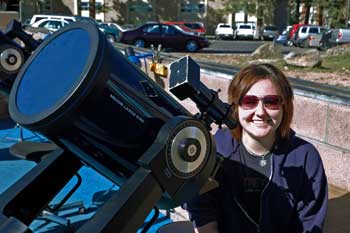About 40 undergraduates from across the country are on campus this summer for real-world research experiences.
They are taking part in Research Experiences for Undergraduates programs funded by the National Science Foundation. REU programs pair students with NAU research mentors in psychology, environmental sciences, astronomy, mathematics and behavioral and conservation.
Each REU project is managed differently, but all provide hands-on research, university credit, a travel and living allowance and free room and board on campus for eight to 10 weeks. Students enrolled at NAU, other universities or community colleges can participate.
“The REU programs are very powerful introductions to research and the whole concept of a scientific degree,” said Laura Huenneke, vice president for Research. “We hope the experiences lead to graduate study and professional employment.”
The Department of Psychology is funding six REUs designated for students from underrepresented backgrounds.
Sophmore Siomara Enriquez is at work on a project with her mentor, psychology assistant professor Andrew Gardner, researching how parenting styles in different cultures affect children with disabilities. “I grew up in Mexico, and this is a great research opportunity where I can be culturally sensitive to both populations,” Enriquez said.
Other REU psychology projects this summer include inquiry into the effects of friendship, stress, childhood behavior disorders, memory and cognitive processing.
Research experiences in environmental science are introducing eight students from tribal and community colleges to the complexity of environments in the Southwest.
“Our research includes a focus on the interaction of Western science and Native American culture,” said Diana Anderson, an associate professor in Environmental Sciences. “Although the students aren’t making a commitment to NAU, many become interested in continuing their academic career here.”
The intensive 10-week experience begins with a one-week research methods course at the Merriam Powell Research Station. Students then attend seminars and social activities, and work with a mentor on an independent research project matching their interests.
Eight undergraduates also are participating in astronomy research experiences. They not only work with researchers from NAU, but also work on projects with scientists at Lowell Observatory, the U.S. Naval Observatory, the United States Geological Survey and more. They are tackling projects about planetary science, astrogeology, stellar astrophysics and extragalactic research.
Arron Shiffer is working with NAU astronomy mentor Donna Weistrop, to analyze Hubble Space Telescope images and gain a better understanding about the stellar content of galaxies. Gabrielle Tepp is here from Michigan State University to carry out research by the side of astronomy associate professor Nadine Barlow to determine the relationships of Mars impact craters and its subsurface ice layer.
The REU program in the Department of Mathematics and Statistics attracted six top undergraduates from around the country to work closely with departmental faculty on mathematical problems.
“The level of research involved is fairly advanced, occasionally leading to joint publications of papers in refereed journals,” said Terry Blows, an associate professor in Mathematics and Statistics.
Behavioral and conservation science experiences include molecular approaches to plant ecology, studies of how microbial activity influences the fate of contaminants in water and soil, and research of the physiological and morphological basis of fish behaviors.
“Receiving NSF funding for so many of these REU programs is a strong endorsement of the quality of research and mentoring provided by our faculty,” Huenneke said. “Recruiting talented students from some of the best colleges and universities in the country to work side by side with our own undergraduates is a great bonus.”



